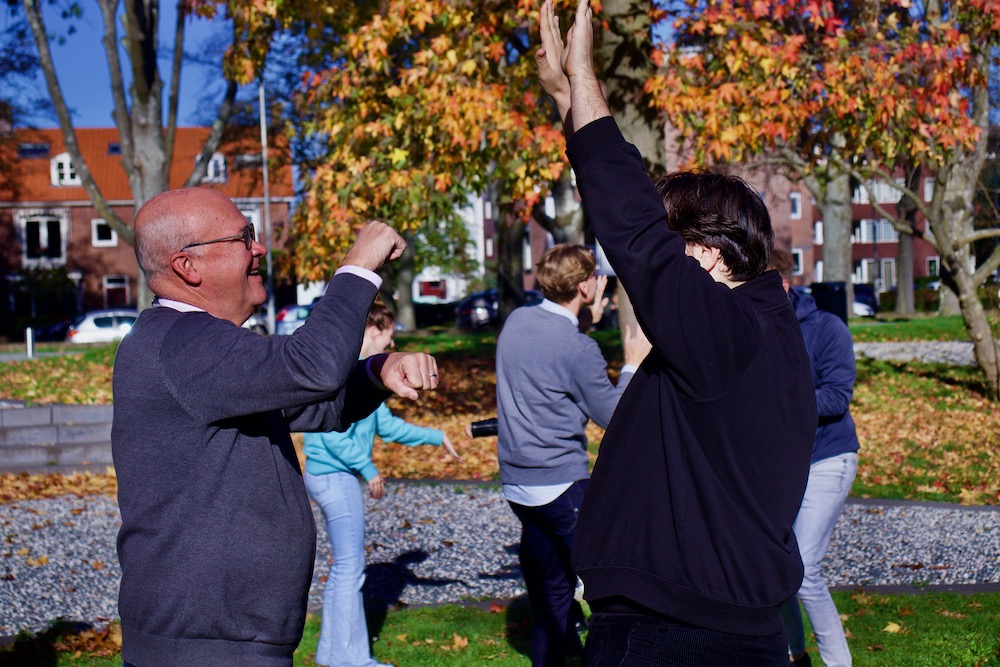Leisure inspires hope for change
‘Challenging the younger generation to create impact towards a more beautiful world’

If you open your eyes, you see the cracks; if you listen, you hear the squeaking and creaking: nitrogen, loneliness, food banks, energy prices, working conditions, gender inequality. The old doesn't seem to work anymore. Old, mostly white, men and women talk on TV. Politicians speak in circles. Scientists say things must change. 'The world is falling apart,’ a cry of urgency to those who want to hear and those who do not. It is clear that things have to change, but how?
Frank Crucq and Juul Paalvast are lecturers of Leisure & Events Management at Breda University of Applied Sciences.
Impact challenge for first-year students
We asked 447 first-year students to make an impact with ‘leisure’ in a fortnight. To throw a stone into a pond. A pond they considered important themselves. They did so in three steps:
- Choose a societal issue that has you puzzled or worried,
- Research a local practice nearby,
- Design, and test an ‘experience’ and execute it.
With these ‘experiences’, they made an impact on the awareness, engagement and empowerment of a target group. The experiences are small, sometimes a bit messy, modest or unfinished. But it is the young generation that is learning how to influence their own future through their profession of leisure. Experiences ranged from an exhibition on meat production, a game on racism at a primary school, and a cooking workshop with elderly people. We asked students to share their ‘impact experiences’ with us, and we made a booklet out of these: ‘101 ways to make impact’. That booklet is a small window to look through to the meaning of this challenge.
Between activism and discomfort
Looking through the small window, a few things struck us. We saw that some students immediately understood what we were asking them to do. They saw what was going on in the world and were looking for a way to do something with it. But there was also a group that did not know what to do and saw no connection with their study programme. We saw that they needed help to make that connection. Helping students see that these societal issues are not just something for politicians or newspapers, but that these questions permeate their own daily work practices. We also saw that it can feel uncomfortable if you, as a student, take on the responsibility of doing something about it. Life and your work practice become more complicated in terms of ethics. Leisure goes beyond pleasure. It is also more than just making money. It raised the question of what is the right thing to do. We found that it helped enormously if students looked for issues closely related to their own everyday lives. Starting from a local situation or practice in their own family, sports club, neighbourhood or side job, for example. This meant that, starting from the major societal challenges (think global), they were able to ask themselves what they themselves wanted to change (act local).
What are students concerned about?
And then the practicalities. To put it into practice, tools are needed, of course. But above all: students should be given hope and positivity to work from. Show them that leisure is aimed precisely at constructivity, that there is hope, and that taking one’s own everyday life as a starting point is valuable. This resulted in the development of creative and meaningful actions. It is interesting to see what students are concerned about and what issues they are drawn to. We saw that Leisure & Events Management students especially like to make a positive contribution to the lives of others. We also saw this social focus reflected in their choices where the following issues were the most popular: gender equality, mental health among students, bullying, sexual harassment, women's rights, loneliness among the elderly, drug abuse, and racism in schools.
Leisure quality and responsibility
Students used what are called core elements of leisure to make a difference. For instance, art served as a tool to make a statement, play and imagination to identify alternative futures, movement to get involved, dialogue to uncover difference in thinking, fun to approach difficult topics, and creativity for refreshing solutions. And we ourselves? We saw the responsibility of and opportunities for leisure as a change method. And we saw our own responsibility to enable this generation to develop their own value in relation to the major societal issues.


































































